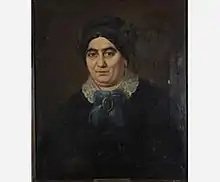
Eleni Tositsa (1796 – 1 April 1866; Greek: Ελένη Τοσίτσα) was a major benefactor to cultural and educational establishments in Greece, including the National Archaeological Museum and the National Technical University of Athens.
Eleni Tositsa was born in Metsovo, Epirus, in 1796.[1][2] She married Michael Tositsas in 1818 and moved with him first to Alexandria in 1820 and then to Athens in 1854.[3] During the Greek revolution, she organised the buying and freeing of enslaved Greeks from Egyptian slave markets.[4][2] After her husband's death in 1855, she inherited most of his property, which he instructed in his will should be used to benefit the Greek state.[2] Tositsa donated large sums of this money to various schools, including funding a new building for the Educational Society's girls' school (known as the Tositseion),[3] and founding a girls' school in her hometown of Metsovo, and to Queen Amalia's Orphanage.[4][2][1][5][6]
On 14 May 1860, she donated a plot of land to the Hellenic State to provide a site for the National Metsovio Technical University, also known as the National Technical University of Athens or the Polytechnic;[4] the university transferred to this site on Patission Street in 1871.[7] The name 'Metsovio' refers to the town of Metsovo in Epirus, the hometown of Eleni Tositsa and Michael Tositsas as well as two other benefactors, Nikolaos Stournaris and Georgios Averof.[7]
The National Archaeological Museum, which was originally located in Aegina, was transferred to Athens when this city became the capital in 1834; construction of a purpose-built building began in 1866 after Tositsa donated the plot of land on which the museum is now located, and the building opened to the public in 1889.[8][9] The street which runs between the museum and the National Technical University is now named Tositsa Street (Οδός Τοσίτσα).[10]
References
- 1 2 "Βιογραφίες ΜΕΤΣΟΒΟ (Κωμόπολη) ΙΩΑΝΝΙΝΑ - GTP". www.gtp.gr (in Greek). Retrieved 2021-01-22.
- 1 2 3 4 "Ελένη Τοσίτσα". history.arsakeio.gr. Retrieved 2021-01-22.
- 1 2 3 "Η Ελένη Τοσίτσα και το Τοσίτσειο". www.arsakeio.gr. Retrieved 2021-01-22.
- 1 2 3 "Greece". Notaries of Europe - Exhibition. Retrieved 2021-01-22.
- ↑ "ευεργέτες: Μιχαήλ Τοσίτσας (1787-1856) και η σύζυγός του Ελένη Τοσίτσα". www.giannena-e.gr. Retrieved 2021-01-22.
- ↑ "Ο Χάρτης των Εξαρχείων: Δύο αιώνες ιστορίας στην ιδιαίτερη συνοικία των Αθηνών". www.news247.gr (in Greek). Retrieved 2021-01-22.
- 1 2 George. "NTUA History". www.ntua.gr (in Greek). Retrieved 2021-01-22.
- ↑ "History". National Archaeological Museum. Retrieved 2021-01-22.
- ↑ "Ministry of Culture and Sports | National Archaeological Museum". odysseus.culture.gr. Retrieved 2021-01-22.
- ↑ "Google Maps". Google Maps. Retrieved 2021-01-22.